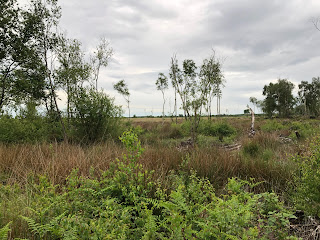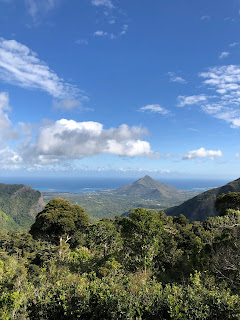Iberian Chiffchaff (maybe?)
It's been 3 weeks now since my first ever rare find - or rare possible-find - whatever that may be called!
On the 4th of June, after a long and exciting day in Nottinghamshire and Yorkshire, my dad and I called in at Thorne Moors at 18:00, hoping to get to 100 for the day. What we weren't expecting was a rarity!
Parking on the road in Moorends, we set off down the Grange Road access track. The vastness of this site soon became apparent; in fact, we walked for at least of 2km before we even got to the moor. We’d clearly come to the wrong place to add waders to our list, or at least the wrong place to find them in a short walk!
 |
| The moor at Thorne Moors - around 2km from the Grange Road parking |
Walking through the small area of woodland after the information board before the main moor itself, I heard a strange song coming from quite deep in the trees, behind an area of deep water. It sounded like a Chiffchaff singing its notes in the wrong order. I pointed it out to my dad. Continuing walking, something stirred in my head and I suddenly realised what I might have heard! I have never heard Iberian Chiffchaff before but have listened to them on Xeno Canto in preparation for my trip to Spain last year. It had taken a minute to realise it but could this bird be an Iberian Chiffchaff? Surely not. I wouldn't let myself believe it, as I know how difficult they can be to separate from aberrant Commons. I even convinced myself there was some other common UK species that I was forgetting. I took several recordings on my phone and listened to the bird for a while, hoping it would move towards the front and show itself. However, the insects became too much to bear so we left the bird, still singing. Later, I sent the recording to the county recorder, sent it to some friends and put it on Twitter and so began a discussion as to its identity.
Here are the two videos I took:
Initial opinions all seemed resoundingly in favour of Iberian, indeed many said that it was definitely Iberian for them. However, rather interestingly, these people often listened to the bird again and quickly changed their mind. It definitely seemed to be a case of the more you listen to it the less sure you are!
Twitter was very helpful. This bird has really taught me a lot about the finer details of bird identification. I am very inexperienced with this species and so I was heavily relying on the opinion of others after my initial 'probable' tweet.
Thanks to Adam Hutt who tweeted the video to his larger following and to all those who retweeted my original video, I soon had lots of opinions. Many were in favour of Common but perhaps more so Iberian - in any case, it was a fairly even split.
Tim Jones said: "Not an Iberian for me, in the original video the phrases are too long (4.6sec & 5.3sec) should be at least <3.5 better if <2.5 sec, and too many phrases (6-10 Iberian, this one 17 & 19)."
Hartshill Hayes Country Park said it sounded good for Iberian and passed the recording on to a friend who has been studying Chiffchaff, who gave some very helpful feedback: "sounds like the opening notes of ibericus song, then four collybita-like 'chief; notes (which ibericus can also give), the four more like the opening notes of ibericus song... thus all notes as such sare compatible with ibericus and ibericus giving a sequence like this have been recorded in Spain - perhaps a 'conflict song' variant. However in phrases like this there are no diagnostic rising 'sheep' notes and no terminal rattle as in classic ibericus song."
Overall, then without the diagnostic call heard or recorded, and no sighting of the bird, this is likely a non-starter when it comes to acceptance. With no more sight or sound since and it being a bit too far away from home for me to refind it, it remains as one that got away. What a fantastic experience though and a really intriguing bird which has renewed my passion for this hobby and my optimism for self-finding, even in a place which seemed so unlikely to hold a rarity! It has been a really important learning experience and reminded me once again how much more there is to learn.
Onto the next rare find now, I can only hope this one is a bird where there can be no doubt whatsoever over its identity - perhaps a Wallcreeper would be nice...!



Comments
Post a Comment